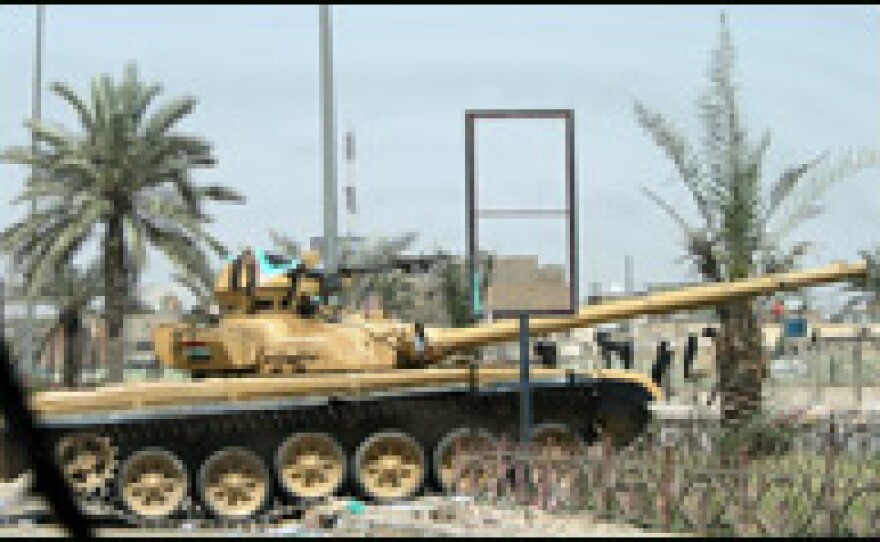
After weeks of sometimes fierce combat in Sadr City, American and Iraqi soldiers are starting to rebuild the southern sector of the Shiite slum.
The goal is to make the southern area a model for the rest of Sadr City, which remains a hotbed of anti-American sentiment.
U.S. commanders are working to jumpstart Iraqi civilian government involvement. But so far it's mostly been an American-led effort.
Iraqi tanks and concrete blast walls guard southern Sadr City along al Quds Street, which the Americans call "Route Gold."
The temperature soared well over 100 on a recent day. But in a hallway of a makeshift outpost of bullet-riddled buildings, Iraqi and American soldiers in full battle gear perked up in the heat: Maj. Gen. Jeffery Hammond, commander of Baghdad forces, was awarding five Americans the Bronze Star.
The fighting is not over in Sadr City. While the general pinned medals on the soldiers, an armored vehicle was positioned to block potential sniper fire into the hallway.
But the fighting has calmed down enough, for now, that Americans are aggressively turning attention to rebuilding the southern section of Sadr City, called Jameela.
"What the people are telling us is that they're sick of the fighting, they're tired of the fighting," says Lt. Col. Frank Curtis, who commands the 432 Civil Affairs Battalion. "They want to go back to a normal life. They're asking the coalition forces to get them just a normal life."
Curtis' unit is spearheading reconstruction efforts, including an office where locals can file compensation claims. So far, more 30 Iraqis have filed and eight claims for property damage have been paid out.
Jameela is home to Baghdad's largest wholesale vegetable and fruit market — part of which was burned and badly damaged during recent fighting. The U.S. is helping to get this key economic engine back up. New lights are being installed on main road next to the market.
Across Iraq, American funded local security groups, mainly formed in Sunni areas, have proved key to taming the insurgency. An effort is now underway to hire 270 locals for a Shiite "Sons of Iraq." Hammond is working with local Sheiks to try to move the process into high gear.
The Americans recently offered a free medical clinic. Iraqi soldiers have been handing out American humanitarian assistance packages, including clothing, shoes and other goods. But so far, it has largely been a U.S.-led and American-funded effort.
The military has funded a temporary program to pick up trash, but basic sewage, trash and electricity services remain shoddy — and there are fears that American efforts to fix things could end up weakening the Iraqi government in the eyes of locals.
A U.S. team is reaching out to the municipal and neighborhood governments and the mayor of Baghdad, but so far, Lt. Col. Dennis Kennedy says, it has been a struggle.
"We continue to engage them, we do talk to them on the phone," Kennedy says of local officials. "We do encourage them to come meet with us."
Throughout the U.S. war in Iraq, a senior commander has often been required to deliver a message face to face. So Gen. Hammond made a surprise visit to an Iraqi army base and talked to Maj. Gen. Muntheer, the commander of the Iraqi Army's 11th Division.
"We need to call the mayor and have him meet us here tomorrow so he can demonstrate leadership right here," Hammond said.
"We'll call the mayor, yes," the Iraqi general told his American counterpart.
Hammond then tapped his hand gently on the knee of Muntheer to emphasize his point.
"He needs to know that we'll be here at nine o'clock and we'll be very disappointed if he can't be here at nine," Hammond said. "The prime minister needs this to happen."
While the reconstruction for this southern section of Sadr City is slowly taking off, the strategy leaves out a massive section of the Shiite slum.
The northern area — the biggest piece of Sadr City — is still firmly in the hands of Muqtada al Sadr's Mehdi Army militia.
Sadr has made efforts to restore the chronically shoddy services there central to his movement's growth and power. Commanders say any rebuilding effort northward will proceed only as security conditions allow. As one commander put it: "I'm a realist ... We need to control what we can control."
Copyright 2022 NPR. To see more, visit https://www.npr.org. 9(MDAzMjM2NDYzMDEyMzc1Njk5NjAxNzY3OQ001))






